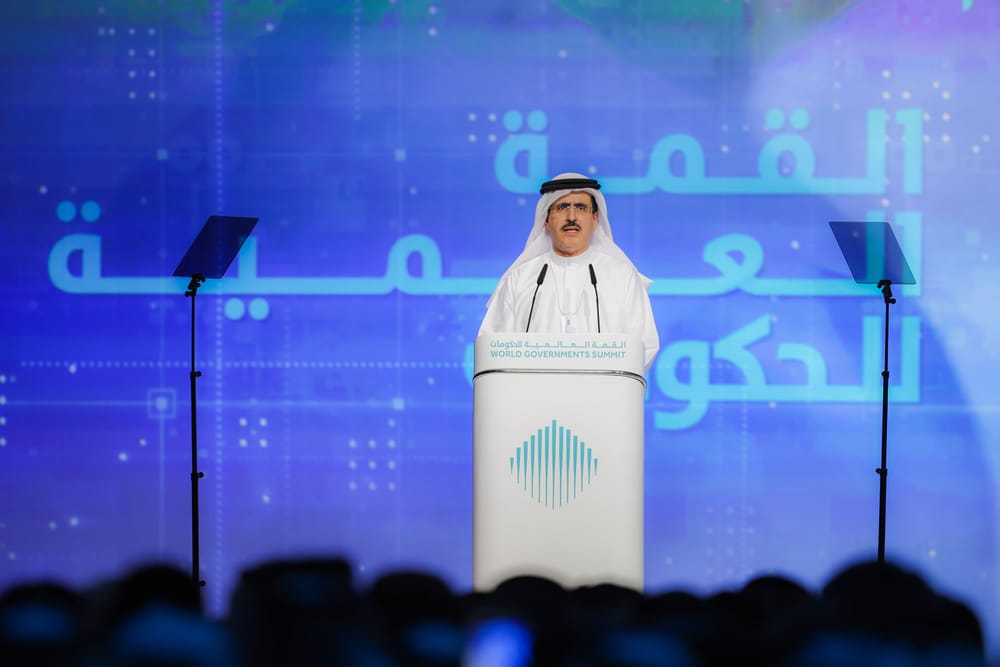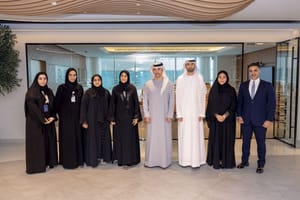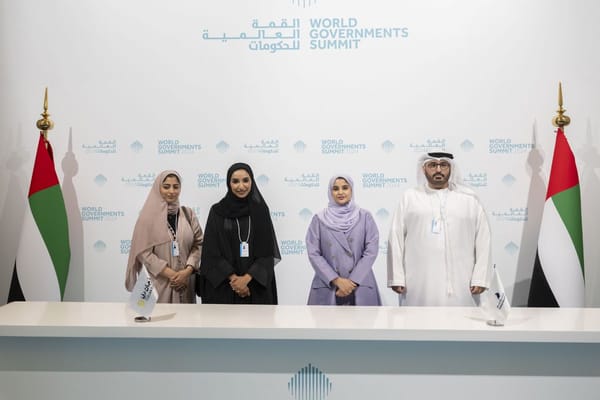Saeed Mohammed Al Tayer, MD and CEO of Dubai Electricity and Water Authority (DEWA), emphasised that the transition to renewable energy is reshaping global power dynamics, noting that it’s important to turn the energy transition challenges into opportunities to achieve greener transition and sustainable development and spread the benefits to everyone.
Al Tayer made these remarks in his keynote speech titled ‘Future global transformations in the energy sector’ at the World Governments Summit (WGS) 2024.
“The World Governments Summit, held under the theme ‘Shaping Future Governments’, has become a distinguished global event that brings together thought leaders, experts, and decision-makers from all over the world to participate and contribute to the development of tools, policies, and models that are essential in shaping governments of the future.
"The summit is held this year under the patronage of President His Highness Sheikh Mohamed bin Zayed Al Nahyan, and the directives of His Highness Sheikh Mohammed bin Rashid Al Maktoum, Vice President, Prime Minister and Ruler of Dubai. The wise leadership always gives great importance to anticipating the future, which is a key component of government plans and strategies. The wise leadership’s vision has been the main factor in the UAE’s pioneering in various fields, including the global transition in the energy sector by increasing the share of clean and renewable energy. This direction focuses on contributing to protecting the environment to combat climate change and lowering the costs of renewable energy technologies to compete with fossil fuels,”
Al Tayer said.
“From a policy perspective, there is an increasing focus on decarbonisation and promoting climate action, with many countries and regions setting ambitious targets to reduce greenhouse gas emissions and increase the share of renewables in the energy mix. This encourages investment in renewable and clean energy projects and creates new areas for innovation as well as job opportunities in the renewable and clean energy sector. From an environmental perspective, switching to renewable energy is a crucial step in reducing carbon emissions and addressing climate change. Moving away from fossil fuels helps mitigate the impact of global warming and reduces environmental pollution. However, it is important to note that the energy transition comes with challenges. For example, the intermittent nature of renewable energy sources is a challenge to energy production and storage. Other main challenges include ensuring the sustainability of international cooperation, providing green financing, improving supply chains, overcoming monopoly of technologies, adhering to good governance practices, and ensuring a green transition for all, among other challenges. It is important to turn these challenges into opportunities to achieve greener transition and sustainable development and spread the benefits to everyone. Geopolitically, the Russia-Ukraine crisis has far-reaching implications for both countries and the broader geopolitical landscape. The crisis has had a profound impact on energy markets, especially in Europe,”
Al Tayer added.
Reshaping global power dynamics
“The transition to renewable energy is reshaping global power dynamics, as countries rich in renewable energy resources, such as the solar-rich countries in the Middle East and the wind-rich countries in Northern Europe, gain strategic importance in the global energy landscape, contributing to lowering the cost of energy for consumers. Energy storage is also a major trend in the energy transition, supported by advances in battery technologies and the increasing availability of storage infrastructure. As the share of intermittent renewables in the energy mix increases, the need for efficient energy storage solutions is becoming more pressing.
"Advances in battery storage, as well as other technologies such as pumped-storage hydroelectric plants and grid-scale energy storage, play a crucial role in enabling grid integration of renewable energy. The Net-Zero by 2050 scenario, as outlined in the recently issued World Energy Outlook 2023 by the International Energy Agency (IEA), will reduce oil prices by over 50 percent by 2030 and 75 percent by 2050 compared to 2022. This scenario will also reduce natural gas and coal prices by more than that. The report shows that production capacity from solar panels in 2022 reached more than 200 gigawatts, while the storage capacity reached only about 10% of that. The report expects that, according to the same scenario, the production capacity of solar panels will increase by about 4 times by 2030, while storage capacity will increase by about 8 times. Globally, the cost of solar energy and storage technologies is constantly declining, while their efficiency is constantly increasing.
It is also expected that the world's storage capacity, consisting mostly of battery technologies, will exceed 1 terawatt-hour by 2030 and that the cost of a battery storage system will fall to less than US $200 per kilowatt-hour by 2030 and about US$130 by 2050. According to the same report, investments in clean energy have increased by 40% since 2020, and the report expected the addition of more than 500 gigawatts of renewable energy in 2023 alone. As a result, the IEA concluded that the path to limiting global warming to 1.5 degrees Celsius, although extremely difficult, is still available,”
Al Tayer added.
Importance of Green Hydrogen
Al Tayer explained that cutting-edge technologies in the energy sector are essential to address sustainability and reliability challenges. Depending on research and development is also essential to driving innovation in this field. Green hydrogen production coupled with advanced storage solutions represents a promising technology. Green hydrogen, produced using renewable energy, has the potential to play an important role in decarbonising various sectors, including transport and industrial processes. Some describe it as the fuel of the future. Furthermore, efficient storage technologies are vital to ensure the continuous availability of hydrogen, making it a reliable energy carrier. Green hydrogen has received significant attention. The IEA estimates that global green hydrogen production capacity could reach more than 170 gigawatts by 2030, a significant increase over the current capacity. Falling renewable energy costs, supportive policies, and increasing demand for low-carbon hydrogen for various industries are expected to drive this expansion. Experts expect a significant decrease in the current high cost of producing green hydrogen in the coming years. According to the Hydrogen Council, the cost of green hydrogen is likely to fall by 50% by 2030.
IEA's Global Hydrogen Review 2023 confirms that green hydrogen could be produced for $1.60 per kilogram by 2030, making it more competitive with current production methods, whose current cost ranges between $3 and $6.5 per kilogramme. In terms of storage, advanced technologies such as hydrogen liquefaction, salt cavern storage, and innovative solid hydrogen storage materials are being developed, ensuring efficient and reliable hydrogen storage. These developments are crucial to enabling widespread adoption of green hydrogen as an energy carrier. Numbers and forecasts underscore the growing importance of green hydrogen, with significant investments and technological advances driving its rapid development and deployment.
Promising Source of Clean Energy
Al Tayer noted that despite the significant technological challenges that still need to be overcome, nuclear fusion remains one of the most promising sources of clean and almost unlimited energy in the same context. While nuclear fission has been a proven source of low-carbon energy for decades, ongoing research and development efforts focus on enhancing safety, radioactive waste disposal management, and cost effectiveness.
“His Highness Sheikh Mohamed bin Zayed Al Nahyan has announced 2024 as the Year of Sustainability in the UAE, extending 2023's theme into the new year. The UAE has established its leading global position in the field of sustainability with its economic, social, and environmental dimensions, as well as the transition of the clean energy sector. The UAE has launched the Net Zero by 2050 Strategic Initiative to accelerate the transition into a green, circular, and sustainable economy. In Dubai Electricity and Water Authority (DEWA), the ‘Sustainable Energy Partner’ of the Summit, we have globally pioneering green projects, most notably the Mohammed bin Rashid Al Maktoum Solar Park, the largest single-site solar park in the world, based on the Independent Power Producer (IPP) model with a capacity of 5,000 megawatts by 2030. Other pioneering projects include the green hydrogen production project and the pumped-storage hydroelectric power plant in Hatta, among others. Several years ago, we stopped launching any new fossil-fuel energy projects. We have also restricted new water desalination projects to reverse osmosis technology using clean energy. During the past decade, the cost of solar energy in DEWA’s projects decreased from 11 cents per kilowatt hour to just 1.69 cents, while efficiency doubled from 11% to about 24%. We have also achieved pioneering global results in various aspects of our work. DEWA ranks first globally in more than ten key performance indicators in its areas of work. These include reducing electricity network losses to 2.0%, losses in the water network to 4.6%, and Customer Minutes Lost (CML) to just 1.06 minutes per customer annually. With these key achievements, we continue the journey of leading and sustainability. As His Highness Sheikh Mohammed bin Rashid Al Maktoum, said, The UAE is betting on the future. It focuses on harnessing efforts, minds, resources, and capabilities to foresee, design and build it,”
Al Tayer added.
“We realise that future expectations vary in nature, goals, numbers, and accuracy and are subject to change over time, but what is constant is humanity’s steadfast hope that governments and peoples will remain cooperative and committed to addressing the various challenges and risks that threaten humanity, in order to protect Planet Earth and achieve sustainable prosperity for us and for generations to come,”
Al Tayer concluded.
News Source: Emirates News Agency









